Could Glasgow return to the orange buses of the 80s?
- Published
Campaigners say bringing the city's buses back under public control will boost the economy
Greater Manchester is full of yellow buses, the most obvious sign they are being brought back under public control. So, could Glasgow make a similar move back to the orange Strathclyde region buses last seen in the 1980s?
For years, much of Scotland's bus network has been in decline, with fewer buses on fewer routes. The end result? Fewer passengers can take the bus to work, college or the shops.
Glasgow has been hit especially hard, with bus use plummeting by 32% in a decade. That's a staggering 70 million fewer bus journeys, in just 10 years.
It's all a far cry from the 1980s, when a fleet of orange buses (officially "Strathclyde Red") were a bright cornerstone of the transport system.
Yet buses are still - by miles - the most-used form of public transport, in Glasgow and across Scotland.
In 2022, Scots made almost five times as many journeys by bus as by train.
And for many, buses are a lifeline service - the only real option to get around.
So improving the network will make a huge difference to millions of people. And there is growing evidence that good bus travel is key to a strong economy.
Radical change
However, improving the bus network may need radical change.
Could that mean a return to how those 80s orange buses were operated?
According to SPT, which runs transport across Strathclyde, the answer is - perhaps, but only in places.
They are looking Manchester for inspiration.

Manchester's bus network will roll out across the region by 2025
The Labour mayor of Greater Manchester, Andy Burnham, has used new powers to replace the deregulated bus network, brought in by Prime Minister Margaret Thatcher in the 1980s.
Her plan was quite simple - bus operators could set up any route they liked.
She argued competition between bus firms would deliver more choice and a better service for passengers.
Critics say that has led to bus firms crowding the popular routes, and neglecting the rest.

Greater Manchester mayor Andy Burnham has brought in a franchise system, which means private bus firms operate on set routes
In Manchester, Mayor Burnham has brought in a franchise system, which means private bus firms operate on set routes.
Some call this "nationalising the network".
He claims this works better for passengers, because they're guaranteed a minimum level of service, wherever they live.
And with some routes more profitable than others, the plan is to cross-subsidise services in quieter parts of town.
This basic franchise model already applies in Scotland - on the west coast ferry network run by Calmac - but NOT to buses.
It has taken years to reach this point and Andy Burnham's plans faced a court challenge from bus operators.
But the road is now open and a new network should be fully in place in Greater Manchester by January 2025.
Boost to prosperity
A newly-released report from the Centre for Cities think tank claims that improving bus services could bring a much-needed boost to Glasgow's prosperity.
The study was done in partnership with the Get Glasgow Moving campaign, which backs public control of the city's bus network.
It says better transport can link people to jobs. It argues the more people it is able to connect, the more attractive a city becomes, because of the greater choice it gives to both workers and businesses.
The study warns that Glasgow does not fare well compared with large European rivals, in part because the transport network does not reach as far as it could.
"Bus deregulation in the UK since the 1980s is widely seen as a failure," the study says. "The Transport Act in Scotland opens up the opportunity to reverse it."
It argues that investment is required, with a franchised bus network and more bus services linking up with rail, ferry and subway.
A franchised network would see a public body, such as SPT, set the precise routes, the timetable, the frequency and take in fares meaning that routes with lower patronage are subsidised by busier, more popular routes.
All this, say researchers, would help the city reach its economic potential.
A date in the diary
The 4th of December is a key milestone. That's when Scotland's local transport authorities finally get the power to develop franchise systems, like the one in Manchester.
It has taken four years since legislation was approved by MSPs. Quite a delay, say critics. Better late than never, say others.
Last month, SPT set out its Case for Change, highlighting a swathe of problems.
It warns:
Bus use is falling across Strathclyde - with passenger numbers down 32% in a decade.
The bus network is shrinking - with the distance covered by buses down 21% over the same period.
Bus services are less frequent - with buses non-existent on many routes in evenings.
Bus fares have risen even faster than the cost of living - they went up 25% in real terms over a decade.
So SPT is preparing a plan for Strathclyde which could see the network nationalised, and a municipal bus service run in parts of the region.

SPT Chief Executive Valerie Davidson said the current model was not working
Chief Executive Valerie Davidson said: "There are a lot of communities in the West of Scotland that don't have access to a bus, particularly in the evenings and at weekends."
She said SPT report showed the current model was not working and suggested options but they would all need more funding.
"If the same amount of money is there, that's not going to make an awful lot of difference to people," she said.
A decision will be made next spring then SPT will build a business case, Ms Davidson said.
The issue of money looms large. How much new money is needed? She won't be drawn.
"I'm not going to pre-empt that," Ms Davidson said.
"We already spend in Scotland not far off half a billion pounds in Scotland on public transport - for buses. That's a lot of money. But it may well take more."
Increased support for buses inevitably comes at a cost. Taxpayers may be asked to pay more in direct subsidy. And in London, motorists now pay a congestion charge to enter the city. Those funds are used to support the bus network.

Ellie Harrison says wholesale change is needed
Ellie Harrison, from the Get Glasgow Moving campaign, told me wholesale change is needed.
"There is a clear economic case for improving our public transport network," Ms Harrison says. "There is also an environmental case and a social case. It should be our number one priority."
Ms Harrison called for SPT to use the new franchising powers and re-regulate the bus companies across the region.
"They can cap fares and they can integrate ticketing with the subways, the trains and the ferries," she said.
"They can also set up a publicly-owned operator for Strathclyde - like Edinburgh's Lothian buses - which can start running sections of that regulated network."
Ms Harrison said the big city regions in England such as Manchester and Liverpool were already making moves to re-regulate with West Yorkshire and South Yorkshire looking into it.
"In the next couple of years, a massive chunk of the north of England will have a regulated, integrated transport system," she said.
"If we don't do it in Strathclyde, we're going to be left even further behind."
Related topics
- Published6 October 2023

- Published25 September 2023

- Published24 September 2023

- Published24 March 2023
